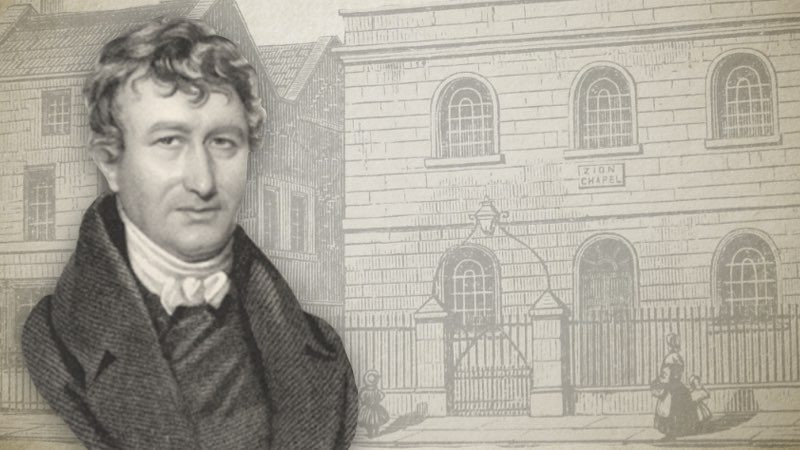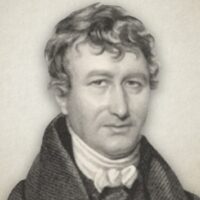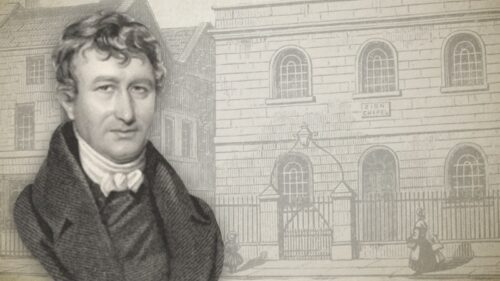
The Late John Warburton Of Trowbridge
John Waters Banks, “Earthen Vessel (1888)”, Page 133:
John Warburton, ah I dear old lad,
Although he groan’d, and seemed so sad,
Made music for the poor;
He told the feelings of his heart,
Sorrow, or joy, or poignant smaart,
When Satan made him roar—Garrard.
Though good John Warburton has long since “entered into the joy of his Lord,” there are still living many who were favoured to listen to his voice, who hold his memory in high esteem. His rich, savoury utterances, when warmed up to the work of preaching the glorious Gospel under the unctuous influence of the Holy Spirit, is still fresh in the hearts of many with whom it is our happy privilege to mingle. It is almost impossible for any lover of the distinguishing doctrines of grace, who can go back 40 years, to pass “Zoar,” Great Alie Street; Gower Street; or Eden Street, Hampstead Road, London, without associating with those divinely consecrated and hallowed places of worship the name John Warburton—“Old John,” as he is familiarly called to the present day. Our own personal recollections of this highly honoured servant of Christ are very brief, but we have witnessed these places crowded to the doors when he was there; and could not help noticing with what breathless attention the people hung upon his lips, and wondered what it all meant. Were it not that we are quite sure that a view of the noble face of this transplanted servant of Christ will awaken in the hearts of many of our readers seasons of sacred joy which they have experienced while listening to the rich experimental utterances that his native eloquence poured forth, when the “golden oil” melted his heart, we should not yield to the desire of bringing him before our readers, and rekindling in their hearts impressions of their early attachment to him, which nothing will ever erase. Grace is indelible, and whenever a poor sinner realises its influence, he is always willing to praise God for the instrument He employs in convincing the soul of the dreadful malady-sin; and of the gracious remedy-salvation by Christ. The many to whom our friend was thus made useful, the great day only will declare.
There is scarcely a minister of the Gospel left of the John Warburton type; but, with all that is said about education and intellectual polish, we do not hesitate to say, that if such men as John Warburton, John Kershaw, William Gadsby, Septimus Sears, and others, were now in existence, they would be earnestly sought after by the poor in spirit and the mourners in Zion.
The north of England has produced some men of strong mental and physical calibre, and among others was the never-to-be-forgotten subject of our sketch, John Warburton, who was born at Stand, near Manchester, in October, 1776. His parents were poor, but they gave him the best education they could; and he was often heard to express his gratitude to God for being able to read and write. In his memoir he says: “My dear mother was a vessel prepared unto glory before the mountains were brought forth. This God made manifest when I was about eight years of age. I had frequently been grieved to see my dear mother sighing, groaning, and weeping while reading her Bible. This so impressed my mind with a desire to know God, and retiring to a private place, said my prayers and firmly resolved as any Arminian in the world to be good; with these natural convictions I went on till about 16 years of age, when by becoming acquainted with many loose companions, I was given up to all manner of wickedness, and so continued until my arrival at that time and place which God had promised, not to offer, but to call by grace. Having heard that a new church, with a fine organ, was to be opened at Bolton (six miles from my home), I determined to go and enjoy myself by spending the few shillings I had at the public-houses on my return. When the minister read the prayers, I thought I had never heard them read in like manner before; but when he got into the pulpit and read his text, it came into my heart like a two-edged sword: ‘Be not deceived: God is not mocked; for whatsoever a man soweth, that shall he also reap.’ I verily believed that he pointed directly at me; his eyes appeared to look through me, and I thought I should have dropped into hell. All my sins from a child stared me in the face, and I trembled like a leaf. He showed what man was by nature, and how far natural men might go in sinning and repenting, until, if grace prevent not, hell would be their portion. My very hair stood on end; he so minutely described my ungodly life, that I verily believed he meant me, and no one else in the church. Again and again the text entered my soul like a dagger. On my way home, after Church was over, I got into a field and fell on my knees, and with all the power of body and soul cried, ‘God be merciful to me a sinner!’ So great was the agony of my soul, that I kept repeating the publican’s prayer till my breath almost failed me. The next Sunday I was off again to Church, but got cut up to all intents and purposes. Text after text of Scripture came, such as Prov. 1:24,25, only to cast me down, till my very joints were loosened. In this state the words came, ‘Seek and ye shall find,’ &c., which afforded a little comfort, but soon got into a worse state of feeling than ever, till ‘Who can tell’ influenced me to go for the last time to hear the Word, when Mr. Roby, at the end of his prayer, pleaded with God if there was one present who had come to make the last trial of His mercy, He would show Himself to such; hope was raised, and when he read his text—’Thou hast ascended up on high, Thou hast led captivity captive, Thou hast received gifts for men; yea, for the rebellious also,’ O, the love, joy and peace that broke into my heart!”
We find it very difficult to condense the biography of a life so full of striking incidents (in the small space allotted us) as was that of John Warburton’s. As regards his call to the ministry, our late dear father wrote, in 1857, and that must suffice on this point:
“The training through which Mr. W. passed for, and his entrance into, the ministry, was of no ordinary character; never were the passions of man’s fallen nature more fully developed than in this good man’s exercises; never, surely, were the sovereign teachings of the blessed Spirit more wonderfully displayed.”
Being forcibly called of God to preach, he was found engaged in the work at Bury, Manchester, &c., and was settled at Rochdale in 1809, where he continued about six years; going from this place, he settled at Zion, Trowbridge, where, amid many vicissitudes and much prosperity, he preached the Gospel for 42 years, breathing his last on April 2 1857. As he was nearing his end he tried to speak, but could not through weakness; he then tried to write, but failed to hold the pen. His daughter Rachel said. “Father, what do you want to write about the Church?” “No.” “The family?” “No.” “Is it about Jesus?” “Aye, aye! Precious Jesus! precious Jesus! Hallelujah!” and so he passed away.
The Church at Trowbridge were exceedingly kind to him to the very last, and laid him well in the grave in the cemetery, followed by about 2,000 people.
Whenever we go to Trowbridge, we never miss the opportunity of paying a visit to his grave. The spot is marked by a solid granite stone about 6ft. by 3, and 4ft. high, which the people at Zion raised to his “loving memory.”
We should like to have said much more, but space forbids. We will only add that we are indebted to the kindness of his grandson, Mr. John Warburton, the excellent solicitor of West Street, Finsbury, for his appreciation of, and the help he has afforded us in giving this sketch.
John Waters Banks
John Warburton (1776-1857) was a Strict and Particular Baptist preacher. He was appointed the pastor of Zion, Trowbridge, where he labored in the gospel among the Lord’s people for forty-two years. John Hazelton wrote of him:
“John Warburton (1776-1857) was a link between two generations, for in the early years of his ministry he was encouraged by William Huntington and afterwards became the friend of Joseph Charles Philpot, whom he baptized at Allington in 1835. Of him Mr. Philpot says: "I have heard Mr. Gadsby preach as great, perhaps greater sermons, but I never met with a minister whose prayer in the pulpit, or whose conversation out of it, was so weighty. Hundreds, perhaps thousands, have borne witness to the power and savour which rested upon his testimony; but the blessing he has been made to the Church of God will never be fully known until the day when the secrets of all hearts shall be revealed." Rochdale and Trowbridge were the places of his pastorates, and by his book, "Mercies of a Covenant God," his memory will long be cherished by the family of faith. His account of his interview with Huntington casts light upon the character of these two men of God and gives us a glimpse of the latter in his study in his house at Hermes Hill, Pentonville: "The good old man was sitting at his table with his cap on, and his Bible open before him, and he looked just like the Prophet Elijah in my eyes. But I was so shaken that I could hardly tell what to stammer out, nor did I know for a few moments what to say. At last, however, I said I had read his book, 'The Kingdom of Heaven taken by Prayer,' many years ago, and it had been made a great blessing to my soul then, as it had been ever since at times, and that I had made a vow that if ever I came anywhere near where he was I would tell him of it. But the dear old man never spoke a word, nor lifted up his head. At last I said, 'It is a mercy that we are poor sinners!' He replied, 'There are many poor sinners that know nothing of the matter.' Warburton then began to speak of the work of God the Holy Ghost in the heart. Huntington looked up and said, 'What dost thou know of the love of God? What is it? And what are the effects of it when known and felt in the soul?' Then I told him what God had done for me. He looked up with tears running down his cheeks and blessed God for what He had taught me; and I believe he brought twenty portions of God's Word to prove that it was the teaching of the blessed Spirit of God; and we both wept together. He opened his table-drawer and scraped up all the silver he had in it and poured it into my hands, and said 'I give you this for your family.' With great cordiality he shook me by the hand and uttered words which have been a source of many comfortable moments to me since, when I have been sinking almost into despair. The words were these: 'May the Lord God of Abraham, of Isaac, and of Jacob, bless thee and go with thee.'"
John Warburton's last moments bore testimony to the blessing invoked. The dying saint wished to say something; he was asked, "Is it to tell how good the Lord is to you in your last moments?" He lifted up both hands, and waving them with peculiar delight, said "Yes, yes." He still continued to appear as if those around him did not sufficiently understand him. With great exertion he lifted up both hands, pointing with his finger and labouring to articulate something. At last he said, "Hal—Hal—!" Then followed with a firm voice, without a waver, "Hallelujah!" and he immediately breathed out his soul. "Mark the perfect man, and behold the upright; for the end of that man is peace."
His son, who became pastor of the church at Southill, Beds, was in his early days very wayward, and enlisted in the army. Dear old Mr. Warburton followed him from place to place with prayers and tears, and at last wrote to Arthur Triggs (1787-1859), who was then at Plymouth—afterwards at Zion Chapel, Waterloo Road, and Gower Street Chapel—asking him to see his boy. He willingly undertook this task, and with the utmost kindness and consideration wrought for the welfare of the lad. His father wrote: "O the kindness, the love, and feeling, that my dear brother Triggs manifested to one so unworthy! It knit my soul to him in a moment, and we were one spirit. Scores of times has my soul begged the best of blessings to rest upon him and his. The poor prodigal returned home, and a hearty welcome he had, and I soon found the work was of God." Here were two good men often libelled as "hard" and "narrow," deeply stirred by concern for this poor wanderer, and in this, as throughout their lives, tender and patient in their dealings with such as he. Every doctrine of grace applied to the heart by the Holy Spirit melts and softens, sanctifies and solemnises, banishes levity, and gives depth, weight, and power to testimony. Father and son never wavered from the truth, were never carried about with divers and strange doctrines, and never speculated or reasoned beyond what they knew and felt for themselves.”




